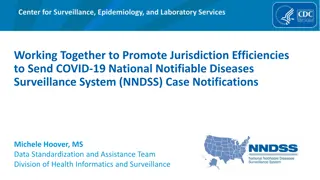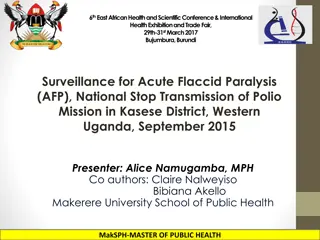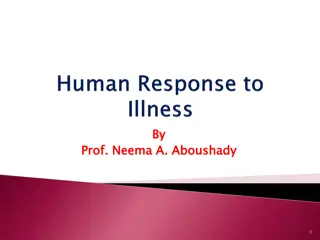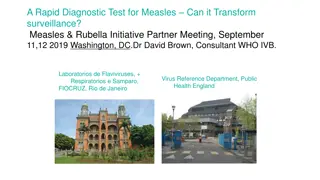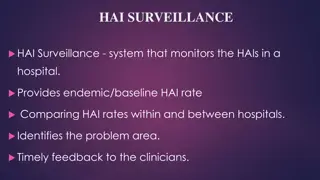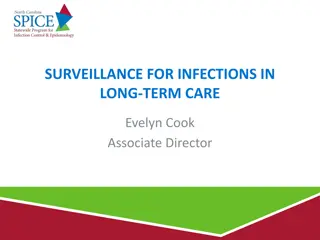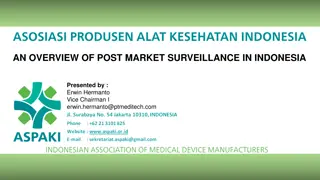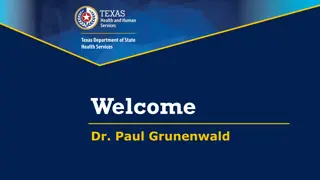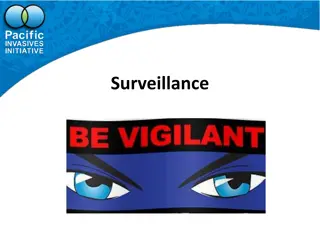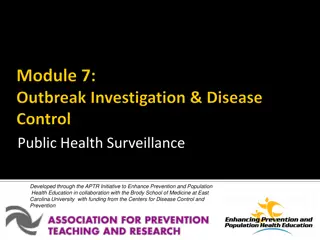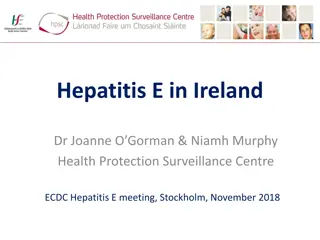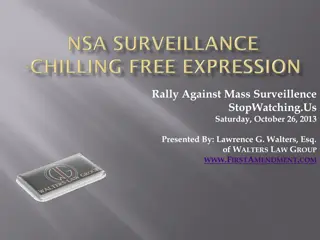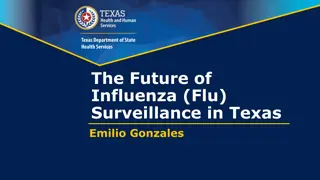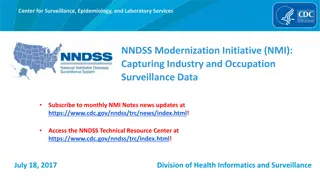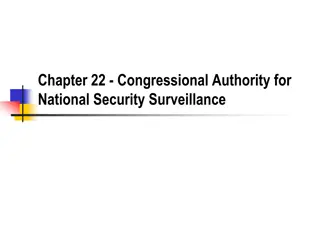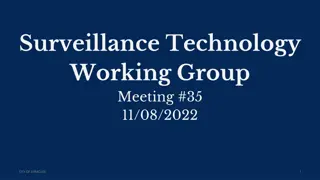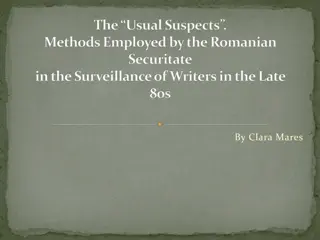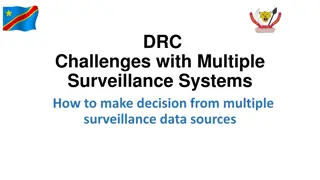School Illness Surveillance Program Overview
Purpose of the program is to provide a snapshot of illness rates in Brown County Schools for active monitoring and response to disease trends. Limitations include school participation rates and data submission timeliness. Disclaimer states the program is a surveillance tool enhancing communication between schools and Public Health, with threshold points subject to change based on data analysis.
Download Presentation

Please find below an Image/Link to download the presentation.
The content on the website is provided AS IS for your information and personal use only. It may not be sold, licensed, or shared on other websites without obtaining consent from the author. Download presentation by click this link. If you encounter any issues during the download, it is possible that the publisher has removed the file from their server.
E N D
Presentation Transcript
Let us know whos here! Please put your name, district/school, and email address in the comments. We are going to use this list to distribute the materials from today s meeting, so we want to make sure it is accurate. Thank you!
COVID-19 and Schools BROWN COUNTY PUBLIC HEALTH
Agenda Welcome and Introductions Illness Surveillance for BCPH & Local Schools Decision Tree Update Communication with Public Health for COVID-19 COVID-19 Scenarios Question and Answer Session Wrap up & Next Steps As we go through the meeting add any questions to the comment section. We will make sure they are addressed
Panelists Ann Steinberger, Nurse Manager- BCPH Ted Shove, Environmental Health Manager- BCPH Nathaniel Wagner, BCPH Lisa Mahoney, Public Health Sanitarian- BCPH Kate Long, Public Health Nurse- BCPH Special thanks to Bernadette Dervish, Dr. Rai, Dr. Lulloff, and Dr. Zemple for assisting with our Q&A!
Illness Surveillance System Overview of System and it s Purpose Demonstration of Surveillance System Instructional Document Roles Document
School Illness Surveillance Program PURPOSE The purpose of this school illness surveillance program is to provide a snap shot of illness rates in Brown County Schools. This tool will allow Public Health and the school to monitor and actively respond to any disease or illness trends occurring within the community.
School Illness Surveillance Program Limitations The effectiveness of the illness surveillance program may be limited by school participation rates, timely data submission, parent/guardian specifying symptoms or diagnosis when calling the school, sharing of educational information.
School Illness Surveillance Program Disclaimer The illness surveillance program is a surveillance tool designed to collect data and enhance communication between schools and Public Health. The threshold set points are a reasonable initial starting point and are subject to change as data is collected and trends analyzed. The breach of a threshold does not indicate a school should automatically close, instead it is a prompt to increase communication between schools and public health.
School Illness Surveillance Program Role of the Parents When informing school of child absence due to illness be specific with the illness Keep symptomatic students home to reduce the spread of illness
School Illness Surveillance Program Role of the Schools Encourage parents to specify symptoms or diagnosis when they call the school Complete illness survey form daily on illness data Monitor illness rates and contact Public Health when thresholds are breached Share public health educational messaging with staff, students, and parents Share surveillance data reports with staff, parents, stakeholders, etc
School Illness Surveillance Program Role of the Schools Encourage parents to specify symptoms or diagnosis when they call the school Complete illness survey form daily on illness data Monitor illness rates and contact Public Health when thresholds are breached Share public health educational messaging with staff, students, and parents Share surveillance data reports with staff, parents, stakeholders, etc
School Illness Surveillance Program Role of Public Health Analyze illness data and communicate with schools regarding illness trends Provide resources to help prevent or minimize outbreaks Provide guidance on disease control measures such as proper cleaning techniques and how long students should stay home Share surveillance data reports on BCPH website
School Illness Surveillance Program Using the Program Collect the Data Schools Enter the Data Schools Analyze the Data Public Health & Schools
School Illness Surveillance Program Next Steps Submit the School Health Contact Survey Review the User Guide Contact us with any questions Nathaniel Wagner nathaniel.wagner@browncountywi.gov
Decision Tree Update Have updated the decision tree to reflect the guidance that came out from DPI Decision tree is meant to be used with the DPI Flowchart Walk through documents
Communication with BCPH Brown County Public Health Structure Contact Tracers: conduct interviews with positive cases, notify their contacts, provide education Facilities Outreach: provide education to facilities with positive individuals, may be involved in the contact tracing process Intake: answer calls that come in from the community, calls are screened and routed to appropriate staff for follow up (staffed by environmental health and nursing) Intake line: (920)-448-6400 All 3 groups are working together to streamline the communication between our staff and community partners.
What Info Will Be Shared From BCPH to Schools Any confirmed case we identify within your school The earliest date the positive individual can return to school If applicable, the earliest date any family members can return to school From Schools to BCPH Last date the confirmed case was in school and if they were experiencing symptoms Close contacts within the school (who they sit by in class, lab partners, etc.) Any information known about extra curricular activities
If BCPH Finds Out First Contact tracers complete the interview and education with the positive individual BCPH Facilities Outreach will reach out to the appropriate administrator or nurse to inform them of the case BCPH and schools will work together to complete contact tracing in the school Schools will send out the appropriate letters Special Close Contact letter will be given to those identified Low risk letter for those exposed, but not close contact
If School Finds Out First Call BCPH to report the name and birthday of the positive case Either use the intake line (1stcase) or your point people (additional cases) Begin putting together a list of close contacts from school BCPH and schools will work together to complete contact tracing in the school Schools will send out the appropriate letters
But what about the weekend? BCPH will prioritize cases among school-age children for contact tracing to ensure timely follow up BCPH will not have facilities outreach staff on call during the weekend Call our intake line or your point people right away on Monday morning if you are notified of a positive case on Saturday or Sunday We will prioritize follow up on Monday morning
Scenario 1 A kindergarten student came to school on Thursday with a runny nose. By lunchtime, the student now has a sore throat and a headache. What steps should the school nurse/administration take once the student starts having more symptoms? What steps if any should be taken regarding the other children in the classroom?
Scenario 1 Continued The child goes in for COVID-19 testing on Saturday and on Sunday they get their results back that he was positive. The parents call the school to explain their child will be out of school. What steps should the school nurse/administration take when they are informed? What should happen with the positive case s siblings? What actions need to be taken for the other kids in the classroom?
Scenario 2 A parent calls in their high school student on Monday. No details are given at the time of call in. On Tuesday the health department gets notified that the student was positive and their symptoms did not start until Monday morning. What type of notification should be sent to parents and staff? Does the school need to initiate a contact investigation? Since the child changes classes many times throughout their day does the school need to be closed?
Scenario 3 A middle school student tells their teacher that their 3- year-old sibling is at home with COVID-19. The office calls home to confirm with the parents. They say it s true their sibling tested positive, but the student was negative. What actions does the school need to take? Does any sort of contact tracing need to occur? What type of notification needs to be sent home to parents?
Resources We will send the following with following today s meeting: Illness Surveillance Program User Guide Illness Surveillance Program Roles Document DPI COVID-like Symptoms Flowchart Decision Tree Q&A Document DHS and CDC have great websites devoted to COVID-19. DHS s site also has links to the DPI guidance.
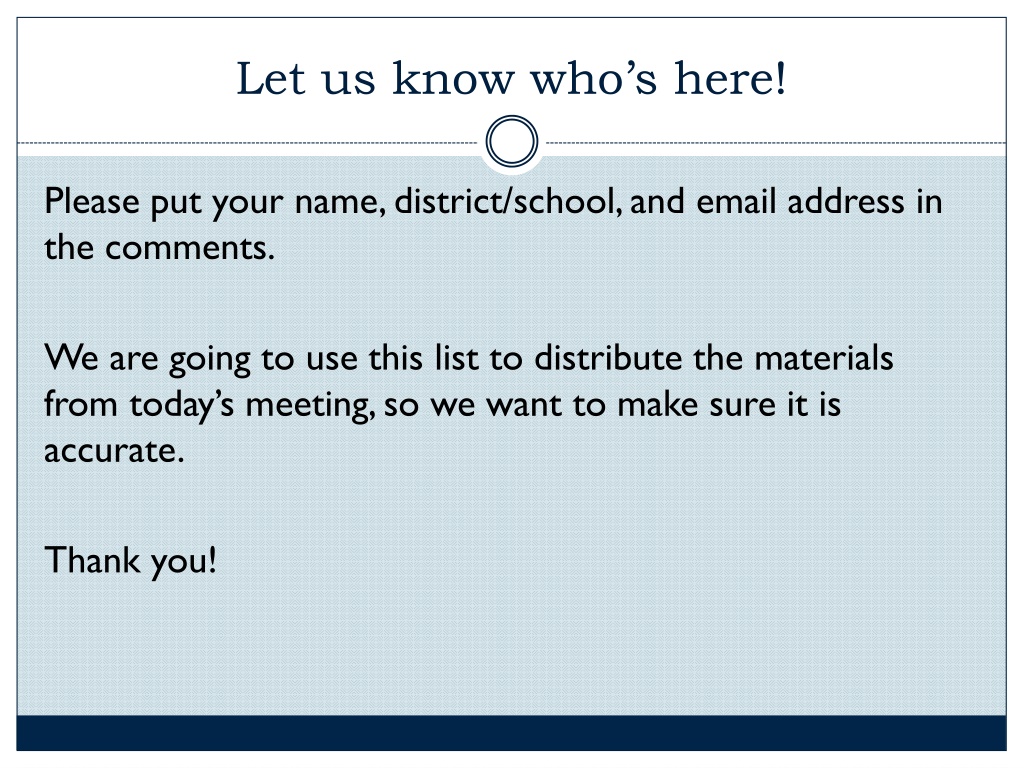










 undefined
undefined











